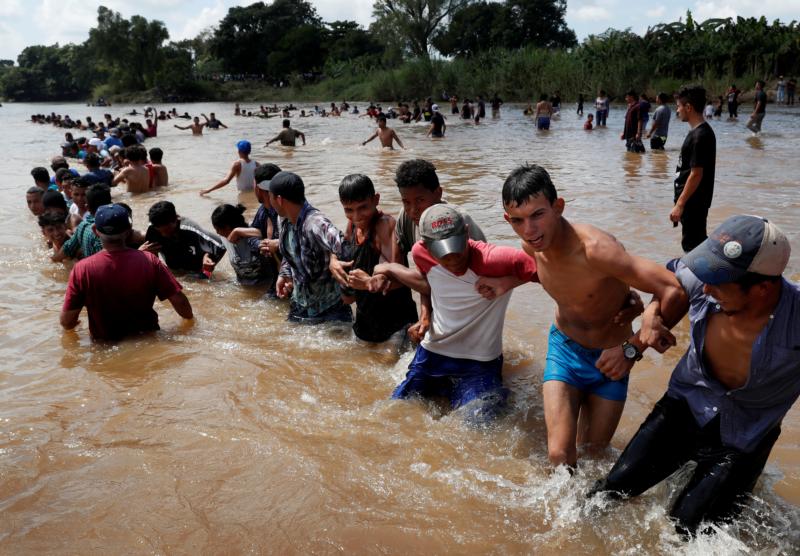MEXICO CITY (CNS) — The Guatemalan bishops’ migrant ministry has rejected talk of the U.S. and Guatemalan governments sending asylum-seekers to a remote and rugged jungle region rife with drug cartel activities. The bishops said conditions there are not secure for Guatemalan citizens, much less migrants.
In a Nov. 18 statement, the migrant ministry raised alarm with a proposal to send planeloads of asylum-seekers from the United States to an airport in Peten department, near the border with Belize and far from the capital of what is considered a highly centralized country with a long history of ignoring its hinterlands.
Asylum-seekers would arrive in Peten as part of a “safe third country” agreement. Such an agreement would force migrants traveling through Guatemala, who wish to apply for asylum, to do so in the impoverished country rather than the United States.
[hotblock]
The U.S. government has forged similar agreements with Honduras and El Salvador with the goal of creating a bottleneck for U.S.-bound migrants in Central America — or, as the migrant ministry posited, “a strategy to push the United States border further south and deny access to its territory and the humanitarian asylum process.”
“It’s undeniable, the interest, the pressure and threats of the United States president so that countries in the region turn into safe third countries. We remind people that we are the most violent region which is not at war,” the bishops’ statement continued.
“Peten does not have the ability nor the infrastructure at this time to welcome, protect and integrate asylum-seekers and refugees,” it added.
Under a Trump administration ruling Nov. 18, beginning in December, the U.S. will have a new screening process to determine if the U.S. or Guatemala will hear the case for an asylum-seeker.
Asylum-seekers could start arriving at an airport in Peten — which mostly serves tourists visiting the Mayan ruins at Tikal — according to The Washington Post. Local media reported Guatemalan Interior Minister Enrique Degenhart said details of asylum-seekers from El Salvador and Honduras being sent to Guatemala remain unclear.
Sending asylum-seekers to Peten would present difficulties, migrant advocates say, since the region is at least an eight-hour drive from the asylum office in Guatemala City and just one migrant shelter serves the region. The migrant ministry noted that some of the Guatemalans forced to flee the region in the 1980s civil war still have not been reintegrated into their communities after returning from abroad.
Guatemala signed the safe third country agreement with the United States over the summer. Polls showed Guatemalans disapprove of the agreement, which was struck in secrecy by outgoing President Jimmy Morales, a former TV clown battered by accusations of corruption and ineptitude.
[tower]
Proponents of the deal say the country did not have a choice but to sign, because U.S. President Donald Trump had threatened to cancel visas and slap tariffs on Guatemalan exports and tax remittances. But critics in the church accuse the president of acquiescing to protect himself in the future.
“If there isn’t a quality of life here for Guatemalans, how are we going to see refugees from other countries arrive here?” said Jesuit Father Miquel Cortes, Guatemalan director of the Faith and Joy education centers.
The United States, he added, “found this government in a moment of weakness and needing to assure its impunity.”
The United States has subsequently signed similar migration accords with El Salvador and Honduras — countries with homicide rates double the 22 murders per 100,000 people in Guatemala. Migrants from Caribbean countries such as Cuba and Haiti and from other continents often fly to countries in Central and South America, then travel north to the United States, where they hope to seek asylum.
Analysts say the United States exerts enormous influence on Central American countries, resulting in their quick compliance on signing migration agreements, even though none of the nations is ready to receive asylum-seekers.
“Even if they had a dramatic drop in the homicide rate, the gang presence is still really high, extortion is really high,” said Rick Jones, migration adviser at Catholic Relief Services in El Salvador. “If you can’t protect your own citizens, how do you expect to protect third-party nationals?”
The Guatemalan migrant ministry noted in its statement, “The humanitarian asylum system in Guatemala (if we can say there is one) has failed.”
Central American countries have historically registered some asylum claims over the years, usually from people fleeing violence in neighboring countries or conflicts further to the south.
The migrant ministry estimated some 800 asylum-seekers and refugees were present in the country, but said, “The Guatemalan state has been oblivious, indifferent, lacking political will and without functional structures to receive, attend to and insert into community life those persons who flee their countries (Nicaragua, Honduras and El Salvador) due to violence.”
Marco Castro, a lawyer at the Scalabrinian-run migrant shelter in Guatemala City, said many asylum-seekers in Guatemala abandon the process due to difficulties in applying, a lack of governmental support and an inability to support themselves, because they never receive the proper work documents.
“The problem is people get tired of struggling,” Castro said. “If they don’t get an income in order to subsist … they give up.”
PREVIOUS: After U.S. reversal, Vatican reiterates two states needed in Holy Land
NEXT: Unearthed church sites show local Christians as pilgrims in Holy Land




Share this story